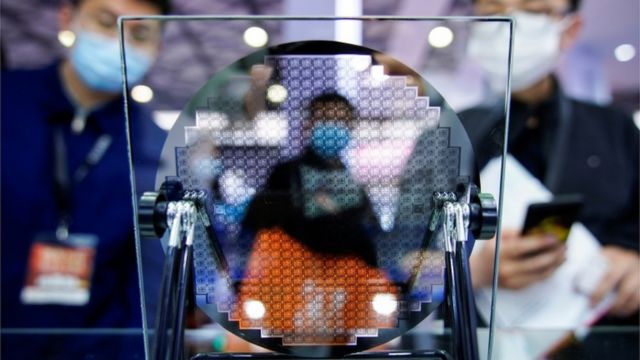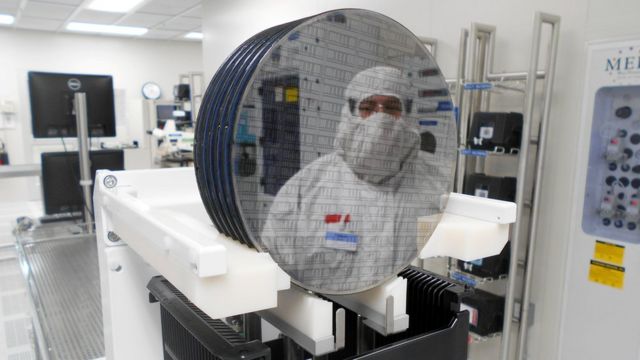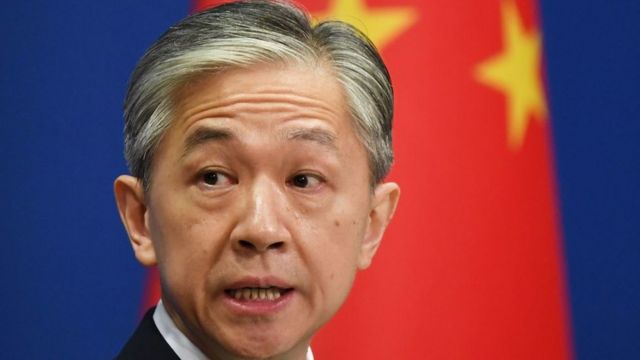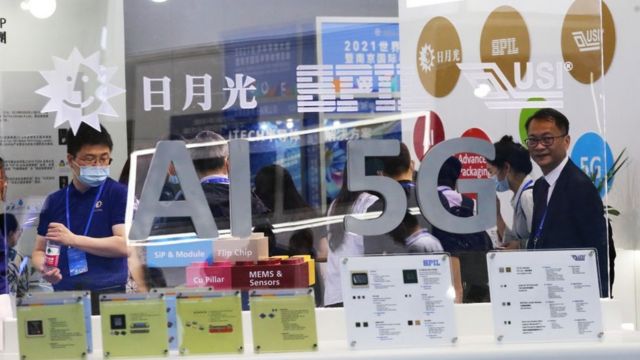The US Billionaire Plan to Compete with China in the Technological Field
The Chinese government has criticized America's ambitious investment plan in the technology sector, saying the US government adopts a 'Cold War mentality'
"The biggest threat to the United States is the United States itself."
The statement was made by the government of China on the announcement of the US's multi-million investment plan to boost its technological development and face the competition of the Asian giant.
The proposal, approved by the US Senate but which has yet to pass through the House of Representatives, achieved an unusual convergence between Democrats and Republicans.
Experts say this reflects how united the two political parties are in the pursuit of China's economic and military ambitions.
The proposal will guarantee funding for research in areas such as artificial intelligence, quantum computing and semiconductors. US President Joe Biden celebrated the bill's approval in the Senate and asked the House to do the same.
"We are in a race to win the 21st century. As other countries continue to invest in their own research and development, we cannot risk being left behind," said Biden.
What does this ambitious plan consist of?
what does the project say
The Innovation and Competence Bill 2021 contemplates the contribution of US$ 250 billion for technological development in the USA, with the objective of increasing the country's competitiveness to face the industrial and military power of China.
The main point is an initial investment of $50 billion for the Commerce Department to subsidize the development and manufacture of semiconductor chips needed for civil and military devices. In recent years, the dependence of the US (and the world) on China for the purchase of semiconductors has grown exponentially.
This dependence has deepened because of the current scarcity of semiconductor chips, which have a particular impact on automobile manufacturing at a time when global demand is recovering after a slump triggered by the covid-19 pandemic.
The project also allocates money to scientific research, in addition to enhancing the possibility of alliances between private companies and universities.
In addition, it includes a number of specific provisions related to China, such as the ban on downloading the TikTok app on government devices and the approval of new sanctions against the Asian country for human rights abuses.
Global scarcity of semiconductors has worsened with pandemic
The bill also allocates US$ 300 million to counter the political influence of the Chinese Communist Party and blocks the purchase of drones manufactured and sold by Chinese state-owned companies. Organizations from China that participate in cyber attacks or theft of intellectual property in the US will also face sanctions when the law goes into effect.
'Imaginary enemy'
The Chinese government has criticized the project, accused the US of suffering a "paranoid delusion" and warned that the plan could seriously damage relations between the two countries.
The bill's approval in the Senate comes at a delicate moment in the relationship between Beijing and Washington.
In May, trade negotiators from China and the US held virtual meetings for the first time since Joe Biden assumed the presidency. And China's Commerce Minister Chen Deming said in early June that his country and the US had agreed to resume dialogue.
China's Foreign Ministry spokesman Wang Wenbin said the bill was a mistake.
But on Wednesday (06/09), Chinese Foreign Ministry spokesman Wang Wenbin insinuated that the US bill could undermine this rapprochement. Wang said the proposal has a "Cold War mentality" and is contrary to the "aspiration of both countries to resume exchanges and cooperation."
"The content of the China-related bill distorts achievements and defames China's development path, its national and international policies," Wenbin said.
"It exaggerates the 'China threat' and seriously interferes in China's internal affairs with Taiwan."
The Foreign Affairs committee of the National People's Assembly, the Chinese legislative body, also expressed "strong dissatisfaction and firm opposition" to the law, according to the Chinese news agency Xinhua.
China has reacted to the US proposal saying it is kind of shooting in the foot
"We are firmly opposed to the United States treating China as an imaginary enemy. The greatest threat to the United States is the United States itself. The most important thing for the United States is to do its own thing right."
The Standing Committee of the National People's Assembly of China is currently discussing passing a law to counter US sanctions on China.
new industrial policy
Analysts believe that the technology investment project represents a shift in US strategy and gives rise to a new industrial policy - a practice that the country abandoned in the 1980s and which consists of State support for specific sectors of the economy considered strategic .
For its supporters, the new industrial policy is essential to respond to Chinese growth, ensure the supply of materials and basic products and develop technologies that can preserve the planet.
"The United States must maintain its position as the most innovative and productive nation", defended Joe Biden
For critics, this type of policy distorts the free market and rewards companies not for the quality of their products and services, but for their ability to lobby.
"The United States has had both successes and failures in the past in trying to push new technologies," Heidi Livingston Eisips, adjunct professor of marketing and business analysis at San José State University, told BBC News Mundo, the BBC's Spanish service. California.
"Part of what was introduced in the bill responds to different interests and it is worth asking whether support for semiconductors for the automotive industry is at the expense of other advanced technologies that the US needs to develop to remain competitive," he points out.
The automotive industry was particularly affected by the shortage of semiconductors
"But what keeps me optimistic is that this bill has achieved a level of bipartisan support that we haven't seen in a long time."
For Andrew Gardner, US ambassador to the European Union during the Barack Obama administration, it is important for the US to stand up to China.
"How can we work to ensure that we write the rules, we determine the world we live in and not the Chinese?" asked Gardner in an interview with the BBC.
"We have to ensure that we remain relevant and innovative."
'Doomed to fail'
But, according to Chinese trade officials and representatives, in addition to the impact that this bill could have on bilateral relations, the plan is bound to fail and will "strangle the possibilities of American companies".
"Even if it becomes law, it will have to face a number of practical problems, because it goes against the rules and trends of the market," Li Yong, vice chairman of the Chinese Commerce Association's Expert Committee, told Chinese state-run newspaper Global Times International.
Li pointed out that many industries, such as semiconductors, need a global supply chain, while the US bill seeks to implement a "US-centric chain."







No comments:
Post a Comment